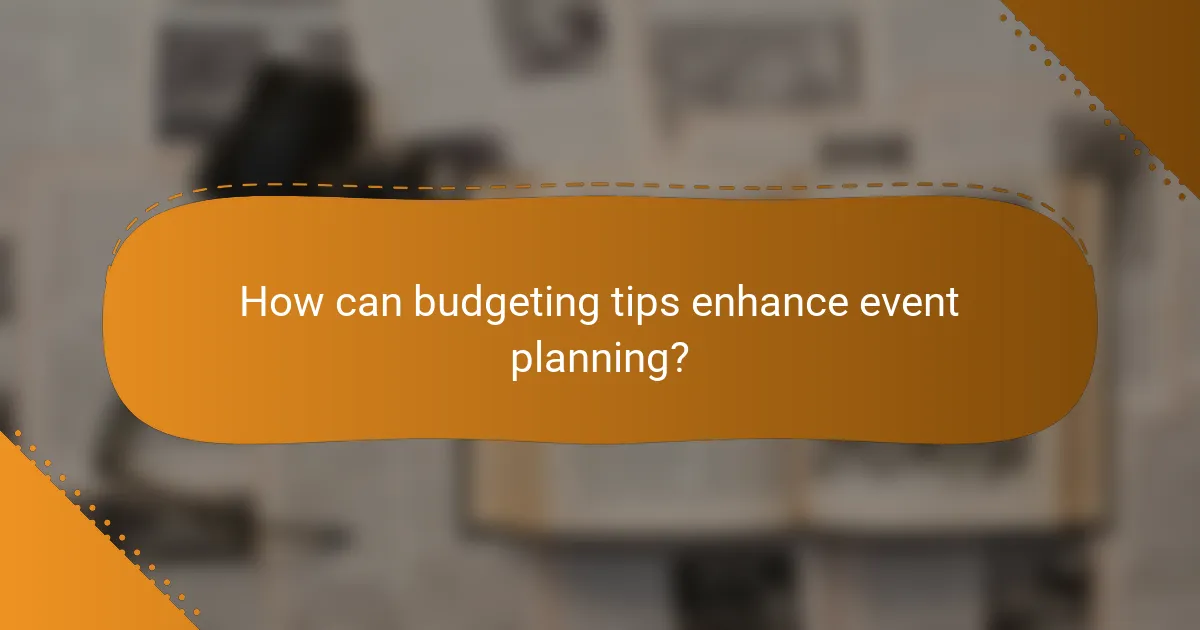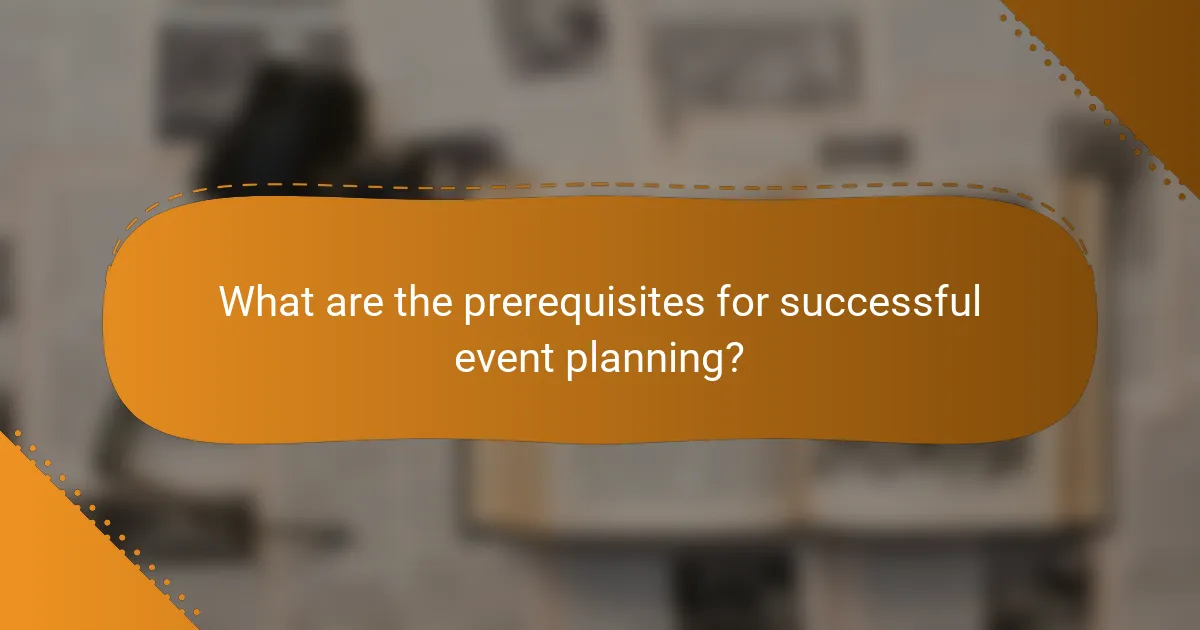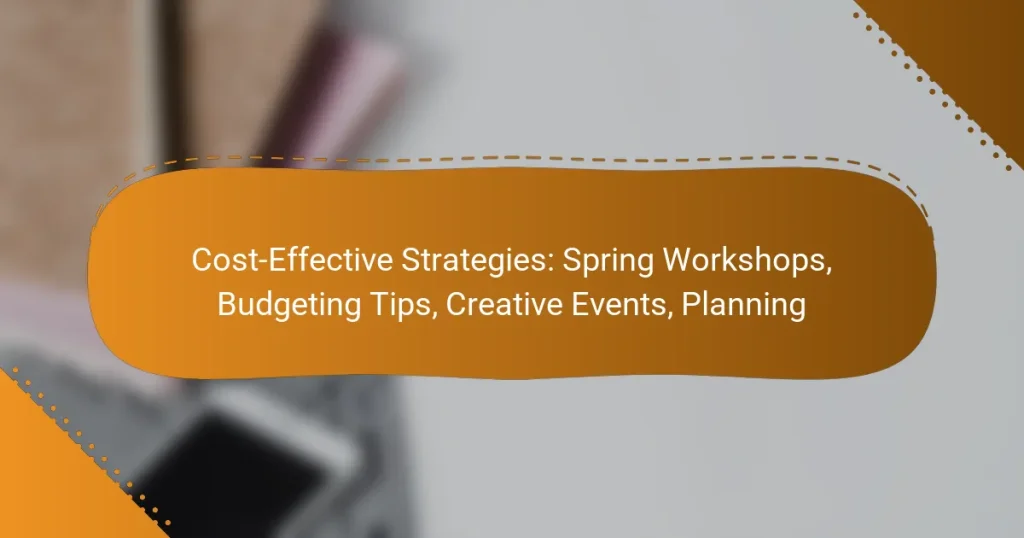Cost-effective strategies for spring workshops can help organizers deliver engaging events while keeping expenses low. By implementing smart budgeting tips and planning creative activities, you can maximize resources and create memorable experiences that foster community and learning.

What are cost-effective strategies for spring workshops?
Cost-effective strategies for spring workshops focus on maximizing resources while minimizing expenses. Implementing these strategies can help organizers deliver engaging events without straining their budgets.
Utilizing community spaces
Community spaces such as local parks, libraries, or community centers can significantly reduce venue costs for spring workshops. These locations often provide free or low-cost options, making them ideal for budget-conscious planners.
When selecting a community space, consider accessibility for participants and available amenities like seating, restrooms, and parking. Booking well in advance can also ensure you secure the best options.
Partnering with local businesses
Collaborating with local businesses can enhance your workshop while sharing costs. Businesses may offer sponsorships, supplies, or even venues in exchange for promotional opportunities during the event.
To establish partnerships, approach businesses that align with your workshop’s theme. For example, a gardening workshop could partner with a local nursery for materials and expertise.
Leveraging online platforms
Using online platforms for registration and promotion can save money and time. Websites like Eventbrite or social media channels allow you to reach a wider audience without hefty advertising costs.
Consider hosting virtual workshops as an alternative to in-person events. This approach can eliminate venue costs and attract participants from various locations, broadening your reach.
Offering early bird discounts
Implementing early bird discounts encourages participants to register in advance, helping you gauge attendance and manage costs effectively. Offering a discount of 10-20% for early sign-ups can motivate prompt registrations.
Clearly communicate the deadline for early bird pricing in your marketing materials to create urgency. This strategy not only boosts initial registrations but also helps in planning resources more accurately.

How can budgeting tips enhance event planning?
Budgeting tips can significantly enhance event planning by providing a clear financial framework that guides decision-making. A well-structured budget helps prioritize spending, ensuring that resources are allocated effectively to create a successful event.
Creating a detailed budget plan
Start by outlining all potential costs associated with the event, including venue rental, catering, decorations, and marketing. Use a spreadsheet to categorize these expenses, allowing for easy adjustments as planning progresses. Aim for a budget that includes a contingency fund of around 10-15% to cover unexpected costs.
Regularly review and update your budget as new expenses arise or changes occur. This practice keeps your financial plan aligned with the event’s evolving needs and helps avoid overspending.
Identifying essential vs. non-essential expenses
Distinguishing between essential and non-essential expenses is crucial for effective budgeting. Essential expenses are those necessary for the event’s success, such as venue fees and catering, while non-essential expenses may include extravagant decorations or premium entertainment options.
To prioritize spending, create a list of all expenses and categorize them. Focus on securing funding for essential items first, then evaluate if there is room in the budget for non-essential elements. This approach ensures that the core aspects of your event are well-funded without compromising overall quality.

What creative events can attract participants?
Creative events that engage participants often include hands-on activities, collaborative challenges, and immersive experiences. These events not only foster community but also provide unique opportunities for learning and networking.
Interactive art workshops
Interactive art workshops allow participants to explore their creativity while learning new techniques. These sessions can range from painting and pottery to digital art and sculpture, catering to various skill levels.
Consider partnering with local artists or art schools to facilitate these workshops. Offering materials included in the fee can enhance participation, with costs typically ranging from $20 to $100 per person depending on the complexity and duration of the workshop.
Outdoor team-building activities
Outdoor team-building activities promote collaboration and communication among participants while enjoying nature. Options include obstacle courses, scavenger hunts, and group sports, which can be tailored to different group sizes and fitness levels.
When planning these events, ensure you have the necessary permits if using public spaces and consider the weather conditions. Costs can vary widely, from free activities in local parks to organized events that may charge $50 to $200 per person.
Virtual reality experiences
Virtual reality (VR) experiences offer participants an immersive way to engage with technology and each other. These can include VR gaming, simulations, or guided experiences that transport users to different environments.
To implement VR events, you can rent equipment or partner with VR companies. Costs may range from $30 to $150 per participant, depending on the length of the experience and the technology used. Ensure that you have adequate space and technical support to facilitate a smooth experience.

What are the prerequisites for successful event planning?
Successful event planning requires a clear understanding of the target audience and well-defined objectives. These elements help ensure that the event meets expectations and achieves its intended outcomes.
Understanding target audience needs
Identifying the needs of your target audience is crucial for effective event planning. Conduct surveys or focus groups to gather insights about their preferences, interests, and expectations. This information will guide your decisions on content, format, and engagement strategies.
Consider demographic factors such as age, profession, and cultural background. For instance, a workshop aimed at young professionals may focus on networking opportunities, while a family-oriented event might prioritize activities for children.
Setting clear objectives
Establishing clear objectives is essential for measuring the success of your event. Define what you want to achieve, whether it’s increasing attendance, generating leads, or enhancing community engagement. Use the SMART criteria—Specific, Measurable, Achievable, Relevant, Time-bound—to formulate these goals.
For example, instead of a vague goal like “increase participation,” aim for “attract 100 attendees to the spring workshop within two months.” This clarity will help you align your planning efforts and evaluate the event’s effectiveness afterward.

How can technology streamline event management?
Technology can significantly streamline event management by automating tasks, improving communication, and enhancing attendee experiences. Utilizing various digital tools allows organizers to save time, reduce costs, and ensure smoother operations throughout the planning and execution phases.
Using event management software
Event management software centralizes all aspects of planning, from budgeting to scheduling and attendee tracking. This type of software often includes features like task management, vendor coordination, and reporting tools, which help keep everything organized and on track.
When choosing software, consider factors such as user-friendliness, scalability, and integration capabilities with other tools. Popular options include platforms like Eventbrite, Cvent, and Whova, which cater to different event sizes and types.
Implementing online registration tools
Online registration tools simplify the sign-up process for attendees, allowing them to register from anywhere at any time. These tools can automate confirmations and reminders, reducing the workload for event organizers and improving the attendee experience.
Look for registration tools that offer customizable forms, payment processing, and data analytics. Platforms like Eventzilla and RegFox provide various features that can help track registrations and manage attendee information efficiently.

What are the emerging trends in budget-friendly events?
Emerging trends in budget-friendly events focus on maximizing value while minimizing costs. This includes leveraging technology, utilizing community resources, and adopting creative formats that engage participants without heavy financial burdens.
Spring Workshops
Spring workshops are increasingly popular for organizations looking to provide educational opportunities at a lower cost. These workshops can be held in community centers or local parks, reducing venue expenses. Utilizing local experts as facilitators can also cut costs while enhancing the quality of the content.
Consider offering a mix of in-person and virtual workshops to reach a wider audience without incurring significant additional costs. This hybrid approach allows for flexibility and can attract participants who may not be able to attend in person.
Budgeting Tips
Effective budgeting is crucial for hosting budget-friendly events. Start by outlining all potential expenses, including venue, materials, and marketing. Prioritize essential costs and look for areas where you can cut back, such as opting for digital marketing instead of printed materials.
Utilize free or low-cost tools for event planning and promotion, such as social media platforms and community bulletin boards. Collaborating with local businesses for sponsorships or in-kind donations can also significantly reduce overall costs.
Creative Events
Creative events often attract more participants while keeping costs low. Consider organizing themed potlucks, community art projects, or outdoor movie nights that encourage community involvement without requiring extensive budgets. These events foster engagement and can be executed with minimal financial investment.
Incorporating local talent, such as musicians or artists, can enhance the event experience while supporting the community. This not only reduces costs but also builds a sense of local pride and connection.
Planning
Effective planning is key to executing budget-friendly events successfully. Start with a clear timeline and checklist to ensure all aspects are covered without overspending. Engage volunteers to help with logistics, which can significantly reduce labor costs.
Regularly review your budget and adjust as necessary throughout the planning process. Being flexible and open to alternative solutions can help you stay within budget while still delivering a quality event experience.


